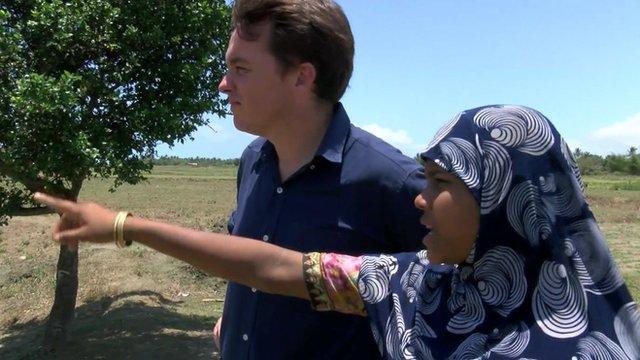Do we expect too much of Aung San Suu Kyi?
- Published
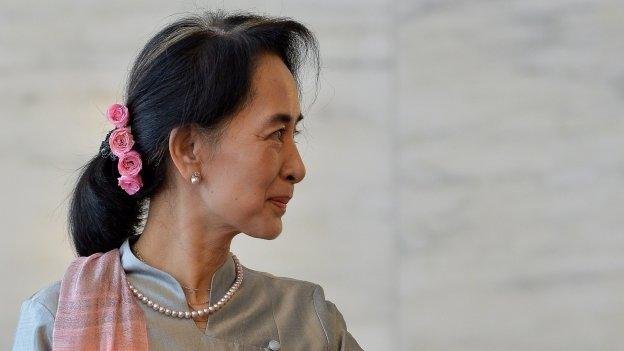
We all need heroes. People of conviction and courage and moral authority to admire. They make us feel it is possible to be better. We dream that some of their wisdom might rub off on us and improve our own little lives.
But that is a lot of pressure to put on anyone's shoulders. Being an international icon can't be easy.
For years, Aung San Suu Kyi - leader of the opposition in Myanmar - was a hero to many in the West.
She was hailed as a beacon of freedom as she endured years of house arrest and pursued a path of non-violence in the face of an authoritarian, repressive military government.
Some of my first memories at the BBC, more than 20 years ago, are of a colleague's daily attempts to make contact with her, usually by fax.
As a young journalist, I was intrigued, trying to imagine what it must be like to live in such acute isolation in her lakeside home.
When she did appear, she seemed calm and dignified, in traditional dress and with a flower in her hair.
Her courage was daunting. She stood firm in her demands, even if it meant rejecting offers to leave Myanmar to rejoin her sons and husband in Britain - even as her husband lay dying.
In those days, she was simply The Lady.
Then Myanmar started to change - now she has become human again.
Criticism over Rohingyas
It was a shock when the Dalai Lama criticised her, external in public - one Nobel laureate rebuking another, however mildly.
The plight of the Rohingyas was back in the news because of a recent surge in migrants from Myanmar.
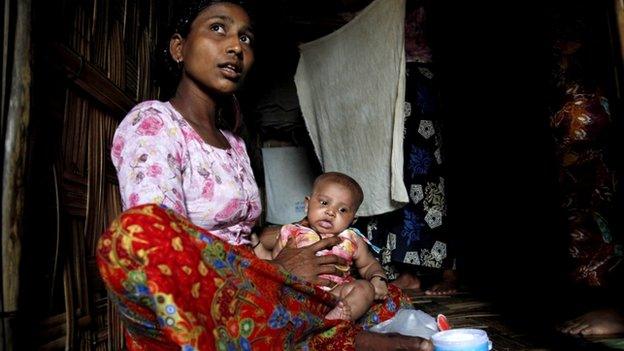
The Rohingya people have attracted worldwide attention
The United Nations describes them as one of the most persecuted groups in the world.
The Dalai Lama said he had raised their plight twice with Aung San Suu Kyi when he met her privately.
She replied, he said, that things were very complicated.
"In spite of that," he said, "I feel she can do something."
So far, despite growing demand for her to take a stance, she has refused to speak out. Her own views aren't clear.
Some argue that she is keeping quiet because she doesn't want to alienate voters in the run-up to crucial elections later this year.
Showing sympathy for the Rohingyas could be politically ruinous at home.
China visit
Even as the row lingered on, she hit the headlines again - this time with a landmark visit to China, external.
Beijing was a close ally of the old military government, engaging with it and supporting it economically while The Lady waited for democracy to come.
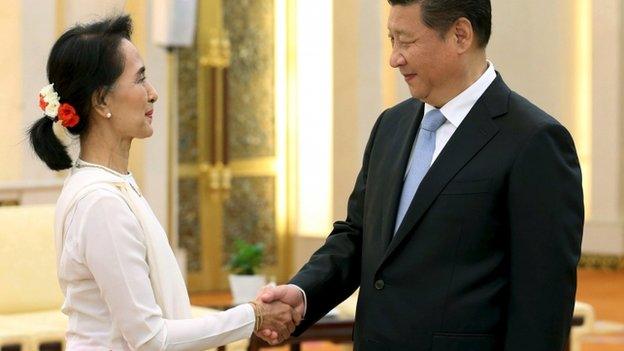
Aung San Suu Kyi made a landmark visit to China
The trip was seen by some as a recognition by China, always pragmatic, that The Lady is now a rising power in the land - and if they want to protect their investments in Myanmar and improve their reputation there, they need to do business with her.
But would she, champion of democracy, do business with China?
What about that other Nobel laureate, Liu Xiao-bo, currently in prison in China for campaigning to end one-party rule?
Would she speak out for him?
So far, there is no evidence that she did.
Again, many who saw her as a pro-democracy hero in the past are wondering why she now seems to favour compromise and realpolitik.

Aung San Suu Kyi:
1945: Born the daughter of Myanmar's independence hero, Gen Aung San, who was assassinated two years later.
1964: Begins studies at Oxford University, settles in the UK.
1988: Returns to Rangoon to look after her seriously ill mother. Becomes leader of a revolt against dictator, Gen Ne Win, organising peaceful rallies calling for reform. Demonstrations suppressed by the army, who seize power in a coup.
1990: Her National League for Democracy (NLD) wins an overwhelming victory in an election the junta later nullified. She was under house arrest, and disqualified from standing.
1991: Awarded the Nobel Peace Prize.
2010: Sidelined from Myanmar's first elections in two decades - but released from house arrest six days later.
2012: Enters parliament after winning a by-election.

Maybe, as an active politician, she does need to be practical - to engage with the real world, with all its flaws and prejudices, and focus her energies on Myanmar, not be diverted by pro-democracy struggles in other countries.
Maybe every situation is different - and some are very complicated - and taking a public stand isn't always helpful.
But there is a powerful counter-argument.
That many people around the world spoke out loudly to support her struggle and her people, however far away they lived and however complicated it seemed.
That despite all the differences in the world, there are universal truths and universal rights that rise above politics.
And sometimes we need heroes who are willing to speak out and be heard.
- Published11 June 2015
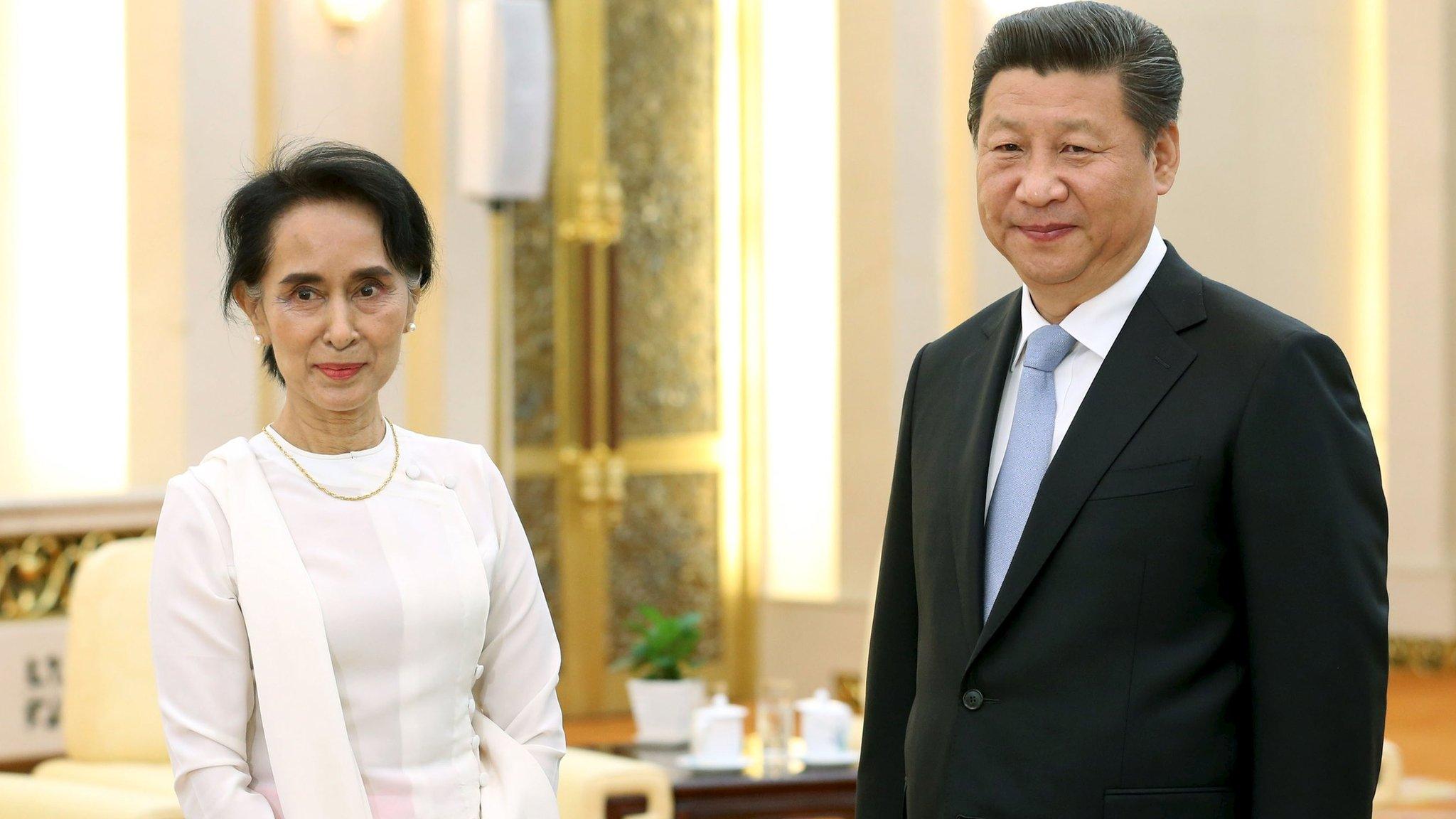
- Published10 June 2015
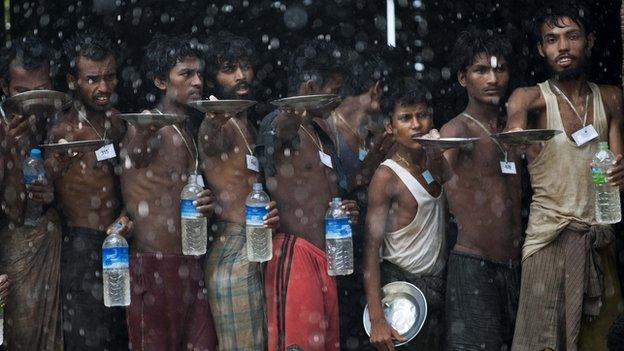
- Published28 May 2015
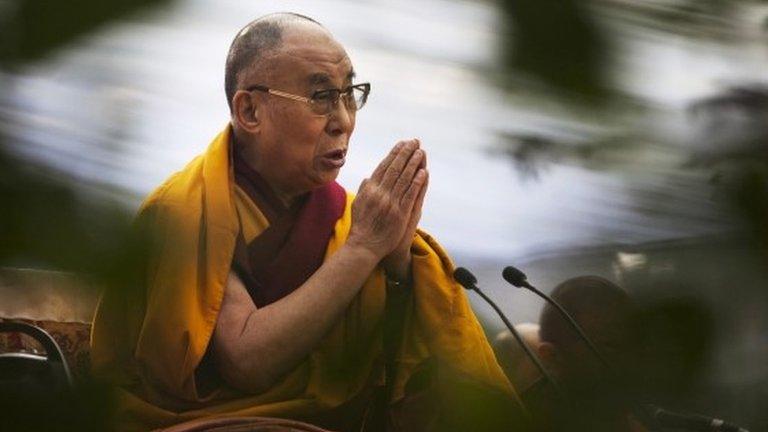
- Published24 May 2015
